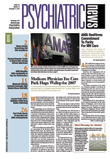The United Kingdom's nascent experience with pay for performance may hold some lessons for physicians and policymakers in the United States.
Family practices in England were highly successful in meeting indicators for quality of care during the first year of a new pay-for-performance contract with the nation's National Health Service, according to a report in the July 27 New England Journal of Medicine.
According to the report, family practices met a median 83.4 percent of quality indicators. However, a small number of practices appear to have achieved high scores through “exception reporting”—the exclusion of large numbers of patients from quality reporting.
Lead author Tim Doran, M.P.H., and colleagues at the University of Manchester's National Primary Care Research and Development Centre, found that sociodemographic characteristics of the patients and practices had moderate but significant effects on performance.
Sociodemographic characteristics of practices included size of practice, number of patients per practitioner, age of practitioner, and whether the practitioner was medically educated in the United Kingdom.
The median rate of exception reporting was only 6 percent, but it was the strongest predictor of achievement: a 1 percent increase in the rate of exception reporting was associated with a 0.31 percent increase in reported achievement. Exception reporting was high in a small number of practices: 1 percent of practices excluded more than 15 percent of patients.
The U.K. pay-for-performance contract allows family practitioners to exclude patients from eligibility for specific indicators in the performance calculations. Legitimate reasons for excluding patients from reporting include the following:
•
The patient has received at least three invitations for follow-up during the preceding 12 months but has not come in.
•
The indicator is judged to be inappropriate for the patient because of special circumstances such as terminal illness or extreme frailty.
•
The patient does not agree to workup or treatment.
•
A specified service is unavailable to the family practitioner.
•
A patient has only recently received a diagnosis or recently registered with the practice.
•
The patient is taking the maximal tolerated dose of a medication, but the level remains suboptimal.
•
The patient has an allergic or other adverse reaction to a specified medication or other contraindication.
Moreover, as the report noted, exception reporting also provides an opportunity for family practitioners to increase their income by inappropriately excluding patients for whom they have missed the targets (a practice known as gaming).
In 2004, after a series of national initiatives associated with marked improvements in the quality of care, the National Health Service of the United Kingdom introduced a pay-for-performance contract for family practitioners. This contract increases existing income according to performance with respect to 146 quality indicators covering clinical care for 10 chronic diseases, organizationof care, and patient experience.
Doran and colleagues analyzed data extracted automatically from clinical computing systems for 8,105 family practices in England in the first year of the pay-for-performance program (april 2004 through March 2005), data from the U.K. Census, and data on characteristicsof individual family practices. They examined the proportion of patients deemed eligible for a clinical quality indicator for whom the indicator was met (reported achievement) and the proportionof the total number of patients with a medical condition for whom a quality indicator was met (population achievement).
They used statistical analysis to determine the extent to which practices achieved high scores by classifying patients as ineligible for quality indicators (exception reporting).
In an editorial accompanying the report, Arnold Epstein, M.D., pointed out that British family physicians received additional salary payments averaging more than $40,000 per physician in the program's initial year as a result of the high achievement—a factor that led to a budget deficit for the National Health Service.
“The high level of performance, which has contributed to the National Health Service deficit, suggests that the targets were set too low or that British physicians improved their practices or their documentation of care to meet the new standards or gamed the system by excluding patients whose care did not meet the performance criteria,” he wrote.
Epstein is with the Department of Health Policy and Management at Harvard School of Public Health and the Division of General Medicine at Brigham and Woman's Hospital in Boston.
“The study... reminds us that policy changes may lead to unexpected consequences, such as the higher payments to doctors by the National Health Service, which have resulted in increased budget deficits,” Epstein wrote. “Perhaps the most important lesson we can take from the experience in the United Kingdom would be to consider carefully the myriad potential consequences of pay for performanceand to monitor the implementation of such a program carefully.”
